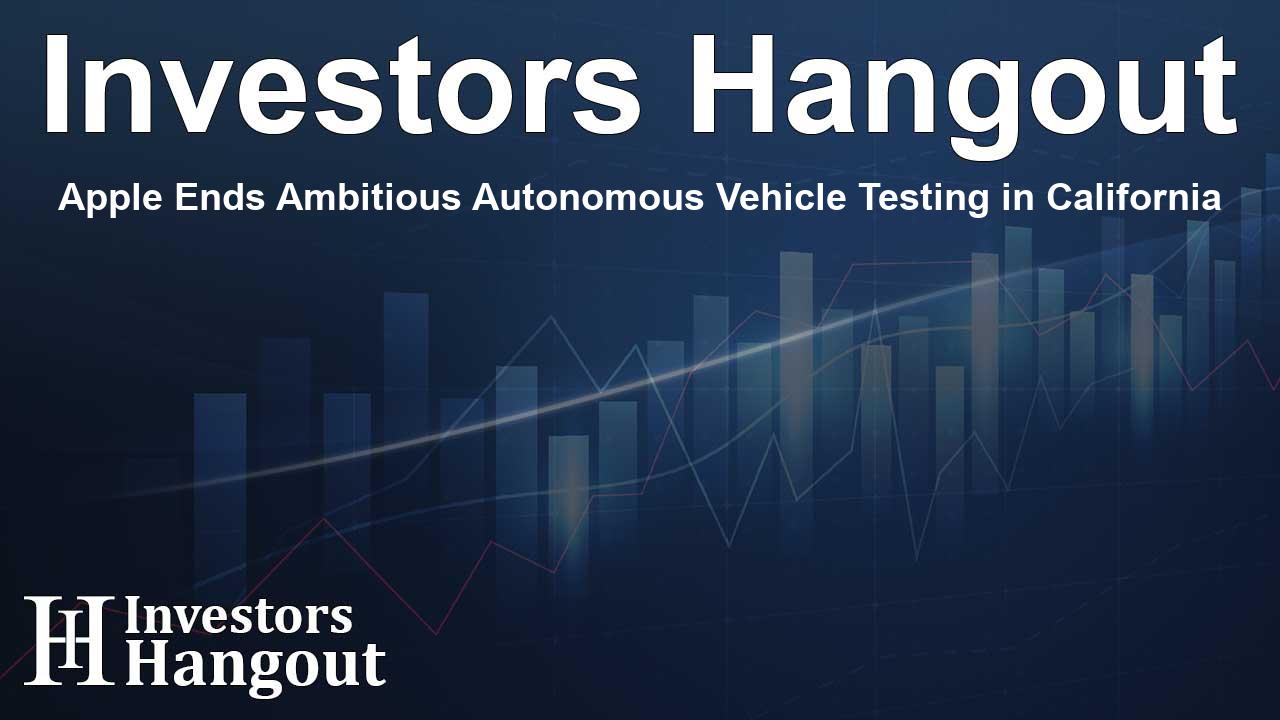Apple Ends Ambitious Autonomous Vehicle Testing in California

Apple's Shift in Autonomous Vehicle Strategy
Apple Inc. has recently made a significant decision that has left many in the tech industry intrigued. The company has terminated its self-driving vehicle testing permit in California, showing a clear shift in its strategy towards autonomous vehicles. This decision comes in the wake of its earlier abandonment of the electric vehicle project.
Details of the Permit Cancellation
The California Department of Motor Vehicles confirmed that Apple requested the cancellation of its permit on a specified date, effectively ending what was initially a promising venture into the self-driving realm. The testing permit had been granted in 2017, allowing Apple to explore the capabilities of autonomous vehicles equipped with safety drivers on public roads.
Testing Vehicles and Technology
During its time as a permit holder, Apple utilized leased Lexus SUVs fitted with advanced sensors and cameras to run trials on California streets. The experimental phase was intended to gather valuable data and insights to shape future developments in this field.
The Impact of Apple's Decision
The cancellation of this permit indicates a considerable strategic pivot for Apple, essentially closing the chapter on its autonomous vehicle aspirations. This move was made public shortly before Tesla Inc. announced its latest Robotaxi model, intensifying the competitive atmosphere in the autonomous vehicle sector.
Understanding the Context of Apple's Project
Apple's project, which reportedly cost the company $1 billion annually, was initiated with high hopes of revolutionizing the automotive industry. However, the vision that began in 2014 faced numerous setbacks, including leadership indecision and various technical challenges, all contributing to its eventual cancellation.
The Competitive Landscape of Autonomous Vehicles
As Apple steps back, Tesla continues to push forward with its ambitions in the realm of autonomous vehicles. Recently, Tesla unveiled its new Cybercab, a two-seater that exemplifies the company's future-focused approach to self-driving technology. CEO Elon Musk has been vocal about his goal to achieve fully autonomous driving capabilities by 2025, despite the significant regulatory hurdles that still pose challenges.
Tesla's Advancements and Future Plans
Tesla’s ongoing efforts represent just a fraction of the evolving competition in self-driving technologies. With numerous companies and tech giants entering the space, the race for the future of autonomous driving is intensifying. Tesla’s confidence in its roadmap bodes well for its ability to stay ahead in this innovative arena.
Apple's Future Direction
As Apple shifts its attention away from autonomous vehicles, it raises questions about where the company will focus its efforts next. Apple has been known for its innovative strength across various tech fronts, so it is likely to look for new avenues that align with its futuristic vision.
Market Implications of Apple's Move
The impact of Apple's decision to cease its self-driving car testing reverberates throughout the technology and automotive sectors. Investors and analysts will undoubtedly be keen to watch how Apple's strategies evolve in the coming months, particularly in relation to its competitors like Tesla, which continue to make substantial progress.
Frequently Asked Questions
Why did Apple cancel its autonomous vehicle testing permit?
Apple's decision to cancel its testing permit stems from its recent strategic pivot away from autonomous vehicles due to numerous challenges faced during the project.
What was the initial goal of Apple's autonomous vehicle project?
The project aimed to revolutionize the car industry by developing innovative self-driving technology, starting in 2014.
How much did Apple invest in its car project annually?
Apple invested approximately $1 billion each year into developing its autonomous vehicle technology.
What is Tesla's current position in autonomous vehicle development?
Tesla is actively progressing with its autonomous vehicle ambitions, recently launching the Cybercab and targeting full self-driving capabilities by 2025.
What can we expect from Apple in the future after this cancellation?
While the future direction remains to be seen, Apple is likely to explore other innovative ventures beyond autonomous vehicle technology.
About Investors Hangout
Investors Hangout is a leading online stock forum for financial discussion and learning, offering a wide range of free tools and resources. It draws in traders of all levels, who exchange market knowledge, investigate trading tactics, and keep an eye on industry developments in real time. Featuring financial articles, stock message boards, quotes, charts, company profiles, and live news updates. Through cooperative learning and a wealth of informational resources, it helps users from novices creating their first portfolios to experts honing their techniques. Join Investors Hangout today: https://investorshangout.com/
Disclaimer: The content of this article is solely for general informational purposes only; it does not represent legal, financial, or investment advice. Investors Hangout does not offer financial advice; the author is not a licensed financial advisor. Consult a qualified advisor before making any financial or investment decisions based on this article. The author's interpretation of publicly available data shapes the opinions presented here; as a result, they should not be taken as advice to purchase, sell, or hold any securities mentioned or any other investments. The author does not guarantee the accuracy, completeness, or timeliness of any material, providing it "as is." Information and market conditions may change; past performance is not indicative of future outcomes. If any of the material offered here is inaccurate, please contact us for corrections.